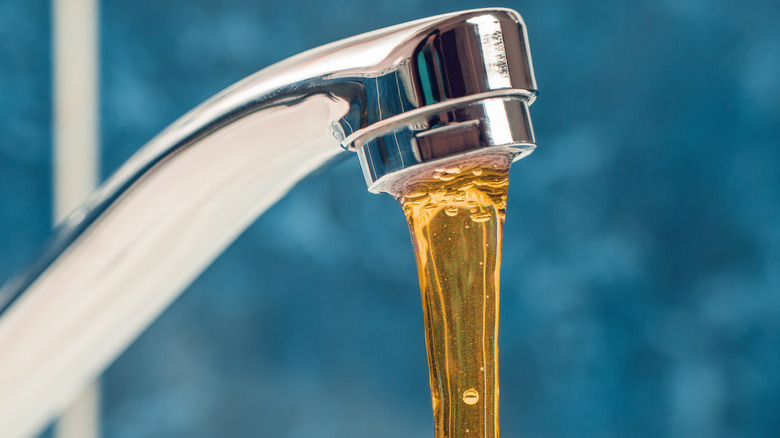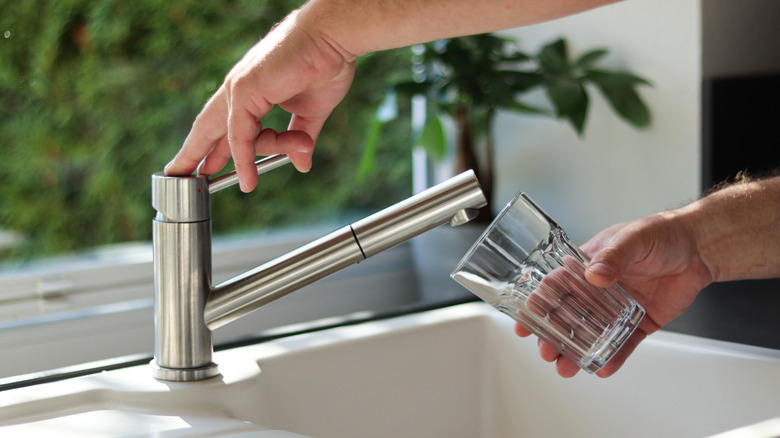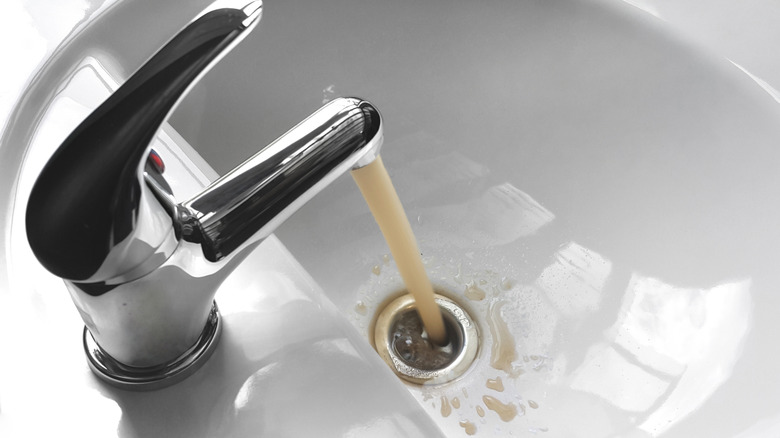Why Does Florida's Tap Water Smell And Taste So Bad?
We may receive a commission on purchases made from links.
There are many aspects of the Sunshine State that make it truly unique, from the multiple invasive and often deadly species that inhabit Florida to the fact it's the only state in the country where you can see crocodiles and alligators living side-by-side. There's also the fact that entire cities in Florida are slowly sinking into the ground. And while these examples are certainly interesting, there's one thing about the state that surely isn't helping its reputation: the fact that its tap water smells and tastes weird.
Florida has issues with its tap water, and it's been going on for some time. Interestingly enough, various states you would think would have terrible tap water actually have some of the best available. The obvious example is New York, which has, as The Guardian puts it, the "champagne of tap waters" despite the fact that it's not generally thought of as the cleanest place. Florida, on the other hand, conjures images of white sand beaches and a tropical climate, yet according to Environmental Protection Agency data from 2023, it was the sixth worst state for Safe Drinking Water Act violations (as reported by Newsweek). The state also regularly shows up on lists of the worst drinking water in the U.S. coming it at number four on Springwell Water's rankings and number nine in Aquasana's. So, what's going on with the water in Florida? Why does it smell and taste bad, and is it safe to drink?
Florida has an array of problems with its drinking water
According to Brita, Florida residents regularly claim to experience a chlorine or chemical taste in their water, alongside a metallic aftertaste and sometimes bitter, earthy, or musty flavors. Perhaps worst of all, there are reports of a rotten egg smell, which would be enough to put anyone off drinking the Sunshine State's tap water forever. What's going on to create what sounds like some truly foul tap water? Well, it's a combination of factors, both natural and a result of water treatment methods.
The bleachy chemical taste is a result of heavy chlorination, which is used to disinfect the water. According to the Tampa Water Department, chloramine (a chlorine and ammonia mixture) is used throughout most of the year, but is switched out for chlorine several times a year. Those who are sensitive to chlorine are, according to the department, more likely to notice a stronger chlorine taste or smell following the switch to chlorine disinfection, while others won't be able to notice any difference. Anyone tasting or smelling a strong chlorine smell in Florida tap water, then, likely is particularly sensitive to this element of the disinfection process.
When it comes to other flavors detectable in Florida water, many of them can be explained by high mineral content and aging infrastructure. This can result in metal leaching into the water itself, resulting in strange flavors. Over time, the interaction between metal pipe walls and the water flowing through them oxidizes metals which are then transferred to the water. This can lead to iron contamination, resulting in a metallic flavor, while copper contamination causes a bitter flavor in the tap water. Zinc can also affect taste and the aforementioned chlorine disinfectants can make these flavors more intense. Depending on the conditions in various areas of Florida, the tastes can vary. High temperatures, system repairs, and changes to water treatment methods can all contribute to changes in these metallic tastes.
Why does Florida tap water smell like rotten eggs?
By far the most off-putting aspect of Florida's tap water is the potential for water that smells like rotten eggs. This particularly upsetting flaw is the result of naturally occurring sulfur compounds which come from groundwater sources, though they can also occur in well water, plumbing systems, or in water heaters themselves. Source water can often contain sulfates which, when converted to hydrogen sulfide by certain bacteria, results in the rotten egg–smelling, foul-tasting water.
According to Florida Health the rotten egg smell that results from this sulfur bacteria isn't an indication of how clean or safe the water itself is. However, the agency does advise regular testing of well water to confirm levels of coliform bacteria such as E. coli, which doesn't sound all that reassuring. You can also test for hydrogen sulfide, which is generally considered safe, though it can produce nausea when concentrations are released during a hot shower, and excessive amounts can result in serious illness or even death.
All of this might have you wondering if Florida tap water is even remotely safe to drink. For the most part, unusual smells and tastes don't mean the tap water is contaminated to unsafe levels. That said, if you happen to be a Sunshine State resident, water filtrations systems, like this under-sink option from Waterdrop, are a good way to ensure the water in your home is safe to drink.


